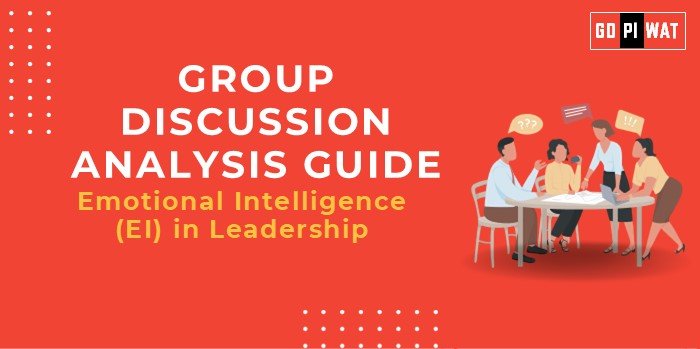🌟 Group Discussion (GD) Analysis Guide: Emotional Intelligence (EI) in Leadership
📌 Introduction to Emotional Intelligence in Leadership
Opening Context: Emotional Intelligence (EI) is increasingly recognized as a cornerstone of effective leadership. Globally, corporate giants attribute their sustained success to leaders who demonstrate empathy, self-awareness, and relationship management.
Topic Background: The concept of EI, popularized by Daniel Goleman, integrates the ability to manage one’s emotions while influencing others positively. In the context of corporate leadership, it bridges emotional awareness with organizational success, fostering high employee engagement and innovation.
📊 Quick Facts and Key Statistics
- EI-driven Leaders: Companies with emotionally intelligent leaders are 21% more likely to retain employees (LinkedIn Workplace Study, 2024).
- Productivity Boost: Teams led by EI-centric managers see a 25% increase in productivity (Gallup, 2023).
- Stress Reduction: Workplaces focusing on EI report a 28% drop in stress-related absenteeism (SHRM, 2023).
- Profit Margins: High-EI companies experience 18% higher profit margins due to improved collaboration and decision-making (HBR, 2023).
👥 Stakeholders and Their Roles
- Corporate Leaders: Drive EI culture, model behavior, and influence organizational policies.
- Employees: Adopt EI principles, enabling harmonious teamwork and innovative problem-solving.
- Human Resource Teams: Develop EI-focused training, assessments, and conflict resolution frameworks.
- Consultants and Trainers: Provide tailored EI programs for leadership and workforce enhancement.
🏆 Achievements and Challenges
Achievements
- Employee Retention: Google’s EI training programs cut turnover by 30% in 2023, showcasing EI’s retention benefits.
- Conflict Resolution: Companies practicing EI witness a 40% faster resolution of workplace disputes (SHRM).
- Innovative Work Culture: Apple’s EI-based leadership fosters an environment where 70% of teams feel empowered to innovate.
Challenges
- Resistance to Change: Many leaders undervalue EI, focusing solely on technical skills.
- Training Gaps: Only 35% of organizations include EI in leadership development programs (HBR, 2023).
- Global Comparison: While companies like Unilever excel in embedding EI into their culture, others lag, especially in tech sectors prioritizing output over people.
📚 Case Studies
Google’s Project Oxygen: Highlighted the importance of EI in managerial success, leading to global adoption of emotional and social skill-building in management training.
🗣️ Structured Arguments for Discussion
- Supporting Stance: “Emotionally intelligent leaders drive productivity, innovation, and employee satisfaction, as evidenced by Unilever’s consistent financial growth.”
- Opposing Stance: “Over-reliance on EI risks overshadowing technical expertise, potentially compromising task efficiency.”
- Balanced Perspective: “While EI is essential for sustainable corporate success, it must complement technical acumen and strategic decision-making.”
⚡ Effective Discussion Approaches
-
Opening Approaches:
- Quote-Based: “As Daniel Goleman states, ‘Leadership is not domination, but the art of persuading people to work toward a common goal.’”
- Data-Driven: “Studies indicate emotionally intelligent leadership improves profitability by 18%.”
-
Counter-Argument Handling:
Use industry comparisons or data to counter skepticism, such as highlighting Google and Unilever’s successful EI integration.
📈 Strategic Analysis: SWOT
- Strengths: Enhanced collaboration, lower turnover, better crisis management.
- Weaknesses: Limited EI training adoption, overemphasis on soft skills.
- Opportunities: Integration with AI for personalized EI training, remote team-building.
- Threats: Misinterpretation as a replacement for technical leadership, cultural resistance.
🎓 Connecting with B-School Applications
- Real-World Applications: EI-linked themes for projects on HR, organizational behavior, or corporate strategy.
-
Sample Interview Questions:
- “How can leaders balance emotional intelligence and technical skills?”
- “Share an example of EI improving team dynamics.”
- Insights for B-School Students: Focus on practical EI applications in internships, especially in HR and operations.


